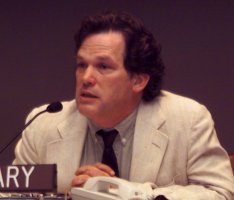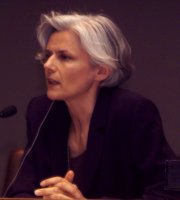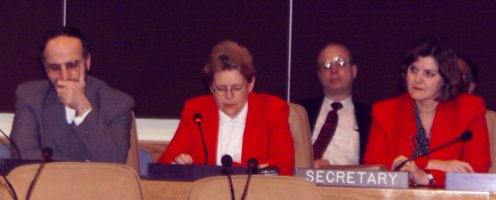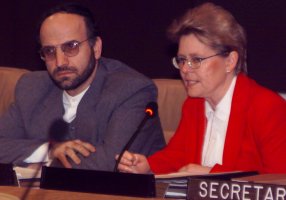| |
Thomas Forster, (IPSA), opened
the discussion with an overview of last week's CSD-8
Multi-Stakeholder Dialogue addressing 4 main areas of concern :
choices in production techniques and consumption patterns; best
practices in land resource management; knowledge for sustainable
food systems including knowledge sharing; and macro-economic
conditions for sustainable agriculture (re: trade liberalization
and globalization). The point that all parties agreed upon was
that in order for SARD to be achievable, civil society had to be
actively engaged, knowledgeable about the issues, and involved in
the decision-making process.There were also 2 schools of
thought regarding what Forster described as "shallow-"
and "deep-SARD". Shallow SARD referred to a focus on
production techniques, quantitative targets and measures to close
the world's hunger/malnutrition gap. Deep SARD refers to a
fundamental paradigm shift away from the industrialized food
system as a way to feed the world, to the support of diversified,
small-holder food producers made up of individual farmers and
farmer networks.
|

Photo : Thomas Forster, International
Partners for Sustainable Agriculture (IPSA).
Within the last 9 years
since UNCED, civil society's knowledge about agri-food issues have
hit a high point, with large public awareness of GMOs and
biotechnological potentials. This calls for more research attention,
more public policy development, and more industry and marketing
responsibility – a broad systemic understanding about the agri-food
industry, which is what SARD is really trying to achieve.
|
|
|
Gordon Bispham,
of the Caribbean Policy Development Centre, and CSD-8 NGO
Caucus Co-Chair, noted that UNCED
brought thousands of farms together to discuss Chapter 14 on
sustainable agriculture. Organic and ecologically friendly
agriculture is outgrowing industrial agriculture in Europe.
Biotechnology (especially GMOs) came front and centre on the
negotiating table as a signal that we need to move away from heavy
dependence on chemicals, fertilizers, and genetic engineering,
because in the case of GMOs, evidence is not conclusive and the
precautionary principle should be exercised in the interests of
human health and ecological integrity. At the same time, its
important to realize that the environmental debate of the early
1990's is only starting to gain a strong foothold in many
countries, despite the advanced negotiations that we are now
engaging in. Nevertheless, the foundation for cooperation has been
laid. The establishment of a Working Group would provide a forum
to flesh out details to bring to the negotiating table.
|
 Annik Dollacker
of the International Agri-Food Network, noted that its more favourable
to increase productivity on existing agricultural lands than to expand
to cultivate new and fragile ecosystems. Industry produces
technologies that can contribute to this goal, and in the past 20
years has changed rapidly in response to problems encountered in the
field. Its important to view the whole system of research and
development as a process of learning and improvement, and that there
is not one singular solution to the problems, but a balance to be
struck among economic, socio-cultural and environmental sectors. Annik Dollacker
of the International Agri-Food Network, noted that its more favourable
to increase productivity on existing agricultural lands than to expand
to cultivate new and fragile ecosystems. Industry produces
technologies that can contribute to this goal, and in the past 20
years has changed rapidly in response to problems encountered in the
field. Its important to view the whole system of research and
development as a process of learning and improvement, and that there
is not one singular solution to the problems, but a balance to be
struck among economic, socio-cultural and environmental sectors.
We are interested in continuing this dialogue through the
establishment of a Working Group to bring our interests to the table.
Rio+10 will be a good forum for collaboration, and a place where all
sectors can meet to implement new strategies on the ground. Industry
has always been a key player in developing solutions to implement on
the ground, and there are links that can be built upon here at CSD-8.
|
|
Briefing by the Co-Chairs of the Ad Hoc
Open-ended Intergovernmental Group of Experts on Energy and
Sustainable Development on the outcome of the 1st session of the
Group of Experts held in New York from 06-10 March 2000.
|
|

Photo (left to right) : Co-Chairs,
Mohammed Reza Salamat, (Iran) and Irene Freudenschuss
Reichl, (Austria). |

 ENB
Summary of Ad Hoc Open-Ended Intergovernmental Group of Experts on Energy
and Sustainable Development ENB
Summary of Ad Hoc Open-Ended Intergovernmental Group of Experts on Energy
and Sustainable Development
 CSD-8
Intersessionals CSD-8
Intersessionals
 Linkages
CSD page Linkages
CSD page
 UN
- CSD website with official
documents UN
- CSD website with official
documents
 ENB's
"Introduction to CSD" ENB's
"Introduction to CSD"

|